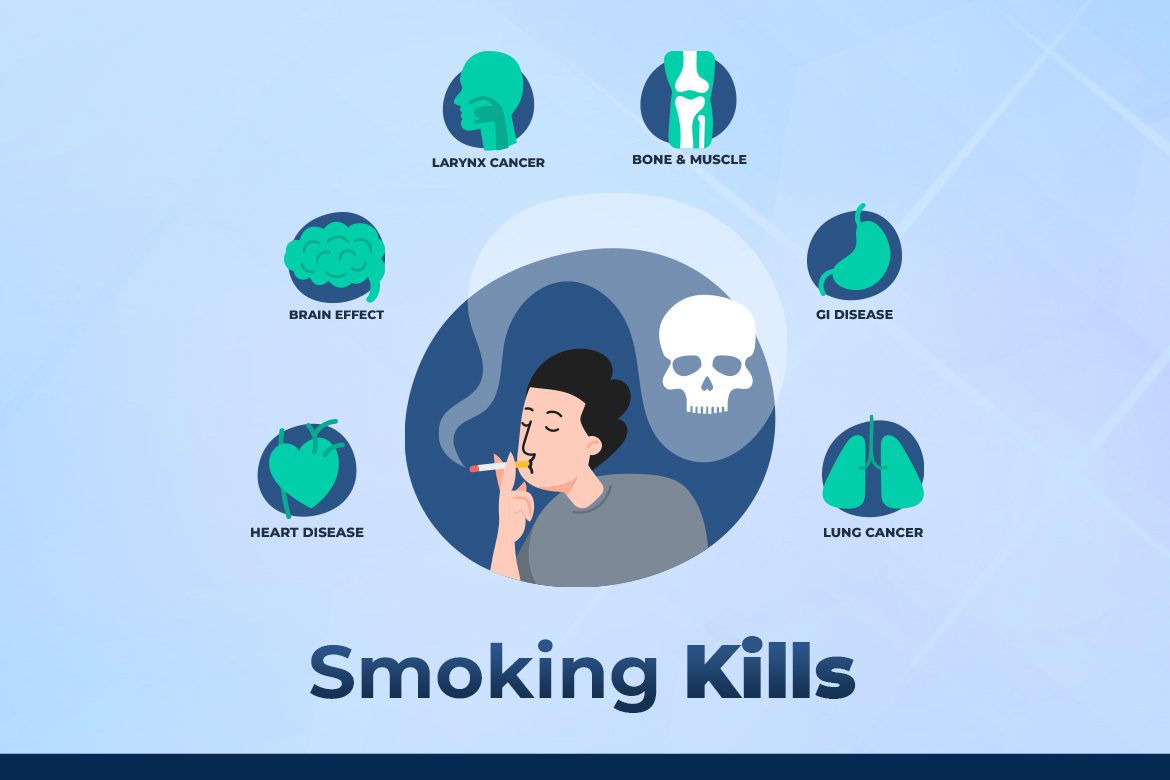



Smoking: Effects, Risks, Addiction, Quitting, Treatment
The effects & risks of smoking
Smoking is a dangerous habit that can lead to severe health complications. The chemicals found in cigarettes and tobacco products are harmful to the body, causing damage to various organs and systems.
One of the most common effects of smoking is lung cancer. It’s estimated that 80% of all lung cancers are caused by smoking, making it one of the deadliest consequences of cigarette use. Additionally, smoking also increases the risk for other types of cancer such as throat and mouth cancer.
Apart from cancer, smoking also affects your respiratory system by damaging your lungs leading to chronic bronchitis or emphysema; both conditions make breathing difficult over time.
Smoking doesn’t just harm your physical health but mental health too. Studies have shown that smokers are more likely to experience anxiety disorders than non-smokers due to nicotine addiction.
It’s clear that smoking poses significant risks and negative effects on individuals’ well-being. Quitting smoking is not easy but taking steps towards reducing cigarette consumption or quitting altogether can help reduce these risks significantly.


Tips for Quitting smoking
Quitting smoking is a challenging but rewarding journey. Here are some tips to help you quit smoking successfully.
Firstly, set a quit date and stick to it. This will give you time to prepare mentally and physically for the change ahead. Secondly, identify your triggers and avoid them as much as possible. Common triggers include stress, alcohol, and social situations where others are smoking.
Thirdly, seek support from family members or friends who have already quit smoking or those who are also trying to quit. They can offer encouragement when times get tough. Fourthly, consider nicotine replacement therapy such as gum or patches which can help manage cravings during the quitting process.
Adopt healthy habits such as regular exercise and a balanced diet to promote overall health while quitting smoking. Remember that quitting is not easy but it’s worth it in the long run for your health and well-being!
By following these tips along with determination and commitment towards achieving your goal of becoming smoke-free will ensure success in this endeavor!
Treatment for smoking addiction
Smoking addiction is a serious problem that can lead to numerous health issues and even death. Fortunately, there are many treatments available for those who want to quit smoking.
One of the most effective treatments is nicotine replacement therapy (NRT). This involves using products like patches, gums, or lozenges that deliver nicotine without the harmful chemicals found in cigarettes. NRT helps reduce cravings and withdrawal symptoms, making it easier to quit.
Another option is prescription medication like bupropion or varenicline. These drugs work by reducing the pleasure of smoking and easing withdrawal symptoms. They can be highly effective but should only be used under medical supervision.
Behavioural therapy is also an important part of treatment. It helps individuals understand their triggers for smoking and develop strategies to avoid these situations or cope with them in a healthy way.
Additionally, support groups and counselling sessions can provide motivation and encouragement during the quitting process.
Remember, quitting smoking requires commitment and dedication but seeking treatment can greatly increase your chances of success!

